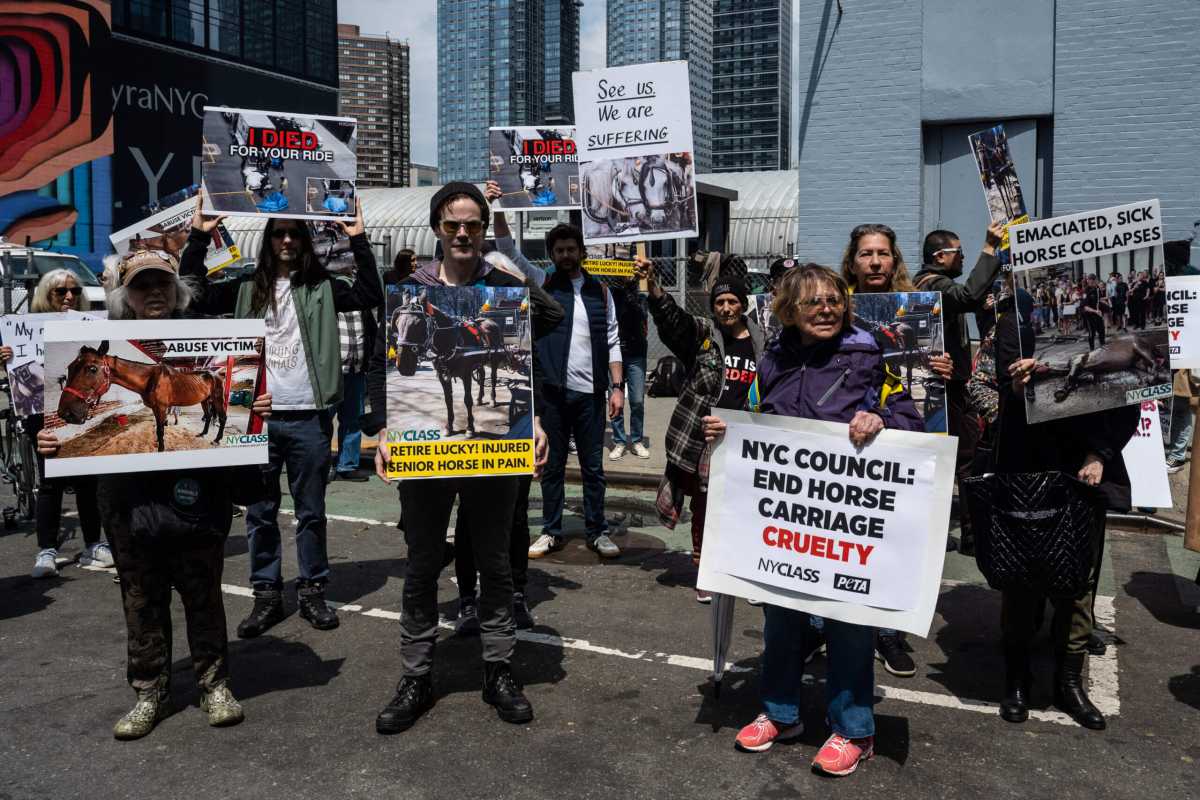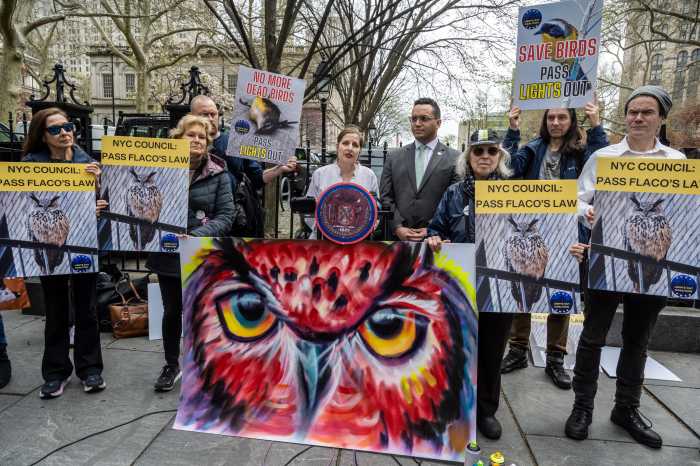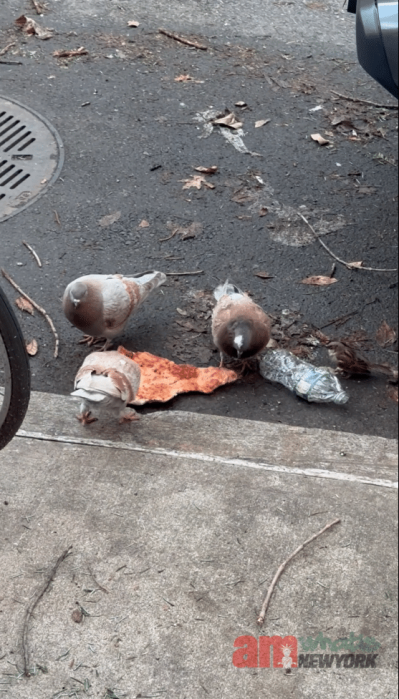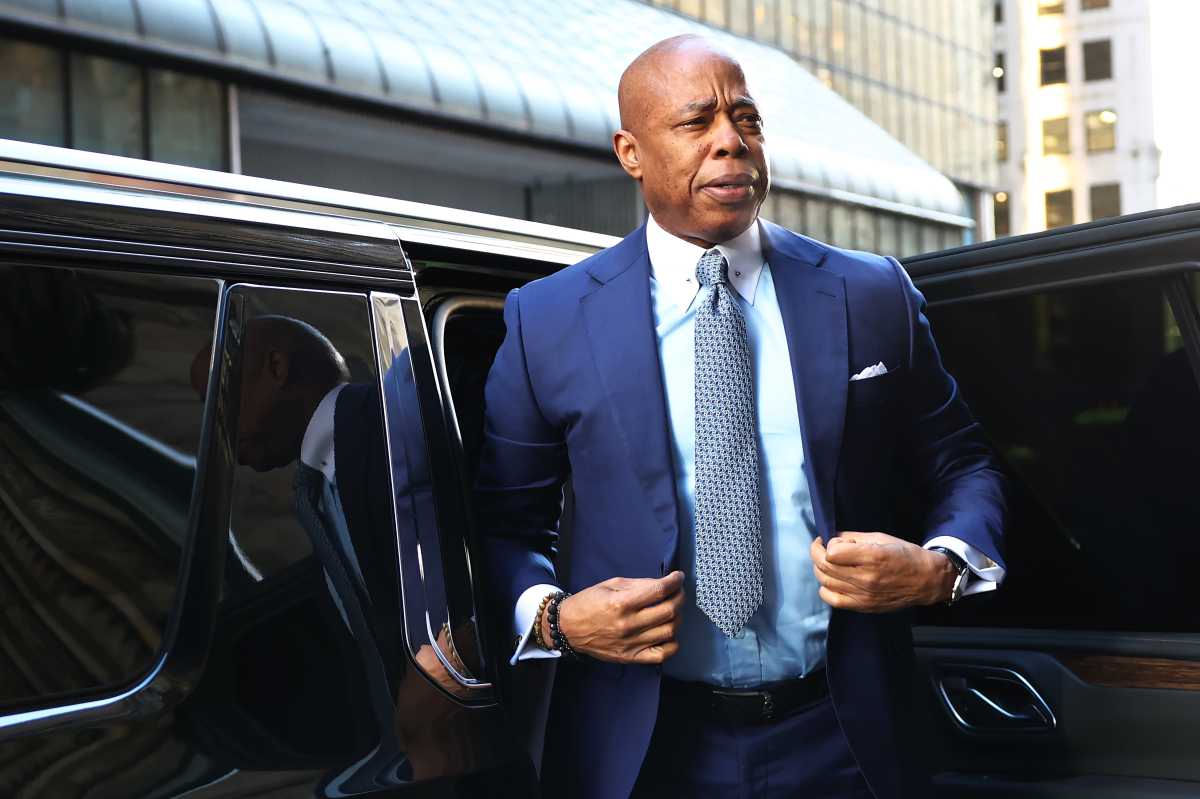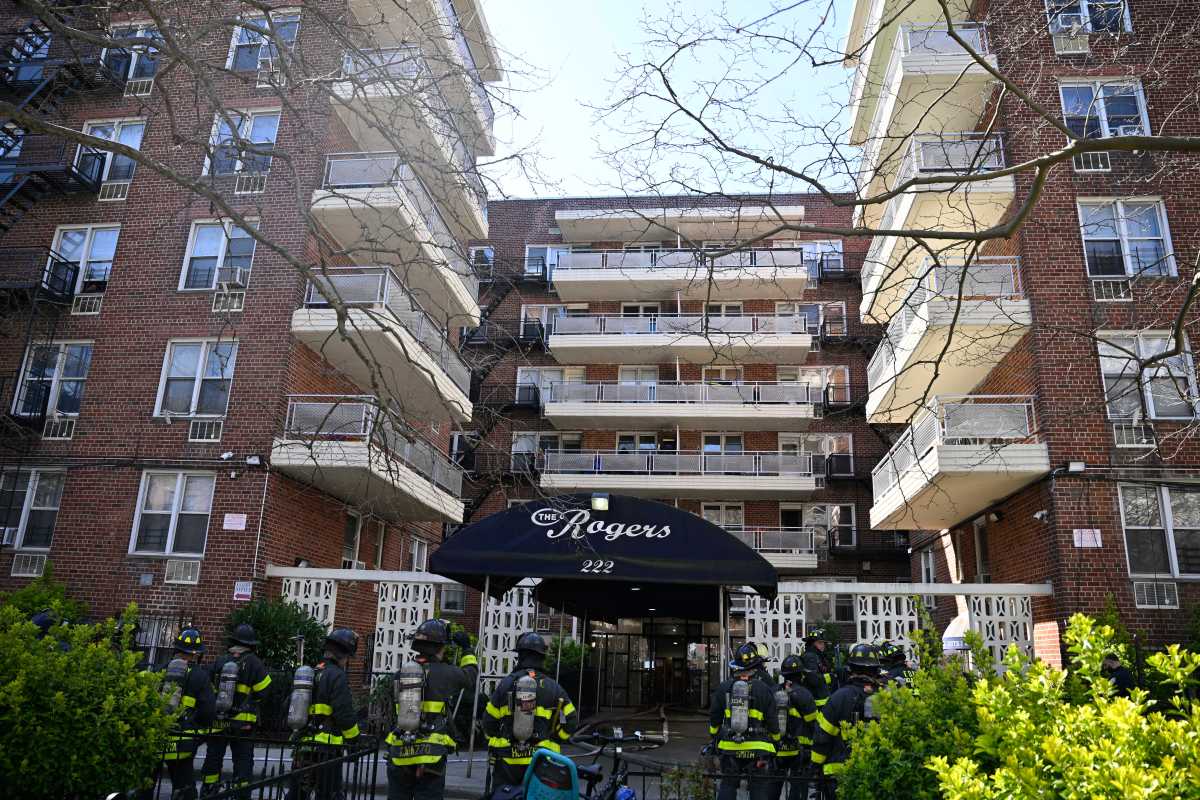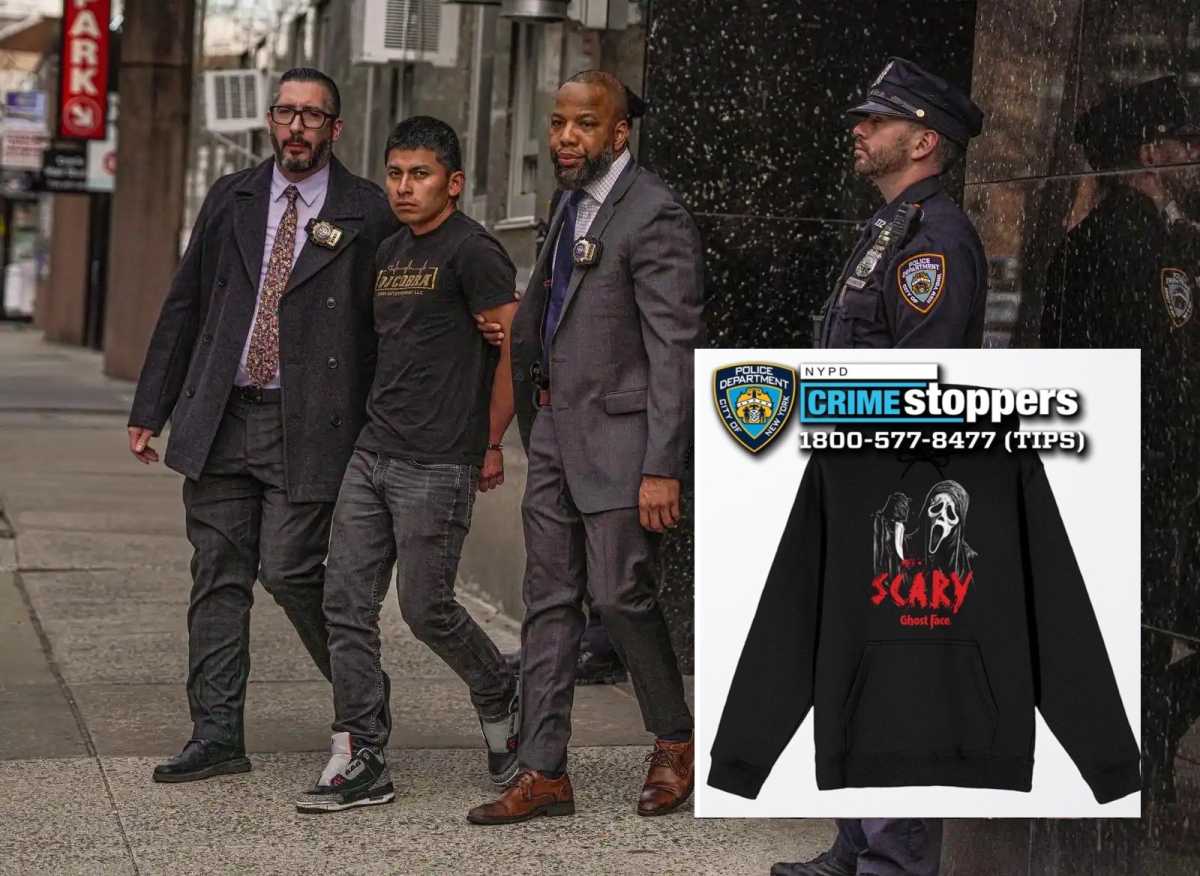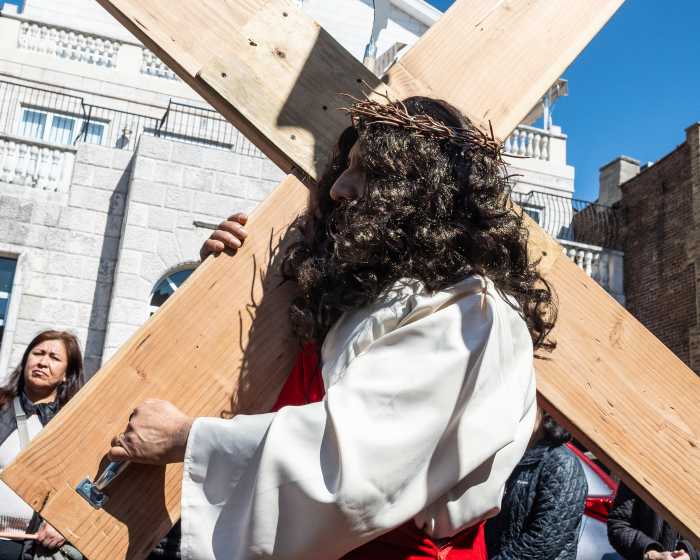It’s been eight months since Ryder the carriage horse collapsed in a viral video captured on New York City streets and later died following an illness, but reports of other injured horses taking tourists on rides through Central Park keep coming in.
At an April 26 rally outside a horse stable on West 38th Street in Midtown Manhattan, long-time horse trainer Michael Petrelli, who is licensed by New York State and the United States Trotting Association, and animal rights activists from NYCLASS and PETA called for the immediate retirement of Lucky and Scott, two senior horses, who they say have been pulling carriages through Manhattan despite extensive injuries.
Representatives of the Transport Workers Union (TWU) Local 100, however, contested the latest allegations, asserting that the equines are being cared for under an array of reforms enacted last year following the Ryder incident. They also voiced opposition to a City Council plan to outlaw the horse carriage industry altogether.
On April 4, Petrelli, who runs the YouTube channel “Harness Horses Uncovered,” claims he witnessed “Lucky” — a 22-year-old former harness racing horse who ran under “Brooklets Bojangle” — pulling a carriage while limping and in pain. He shared his concern with Lucky’s driver, who he alleges disregarded his horse’s distress and went on to pick up another fare.
Petrelli reported Lucky’s condition to the mayor’s office, and the horse was taken off the street for further examination. He and animal rights activists fear that Lucky didn’t receive proper veterinary care and worry that he might end up in a kill pen.
“It’s just about making money to them [the carriage industry], and the horses come last,” said Petrelli, adding that the horse carriage industry was offered $25,000 from Bottomline Concept CEO Josh Fox for Lucky so he could retire at a humane farm. “Lucky is not the only horse I’ve seen with visible injuries. There are over a dozen other horses I have seen on the streets that have untreated leg and hoof issues.”
Then, on April 15, Petrelli says he witnessed another carriage horse, 20-year-old Scott, in distress. Petrelli got a video of Scott as the horse was short-shuffling up front and appeared visibly sore.
The experienced horse trainer says he recognized that Scott was moving like a horse that is “tying up,” a term to describe a condition known as Polysaccharide Storage Myopathy (PSSM) — a disorder that causes muscle cramping and can lead to death if left untreated.
“He [Scott] was visibly sore up from and sluggish,” Petrelli recounted. “He was not even flexing his hocks. Scott was in trouble, and he’s now been taken off the streets as a result of my video, but he’s still at risk.
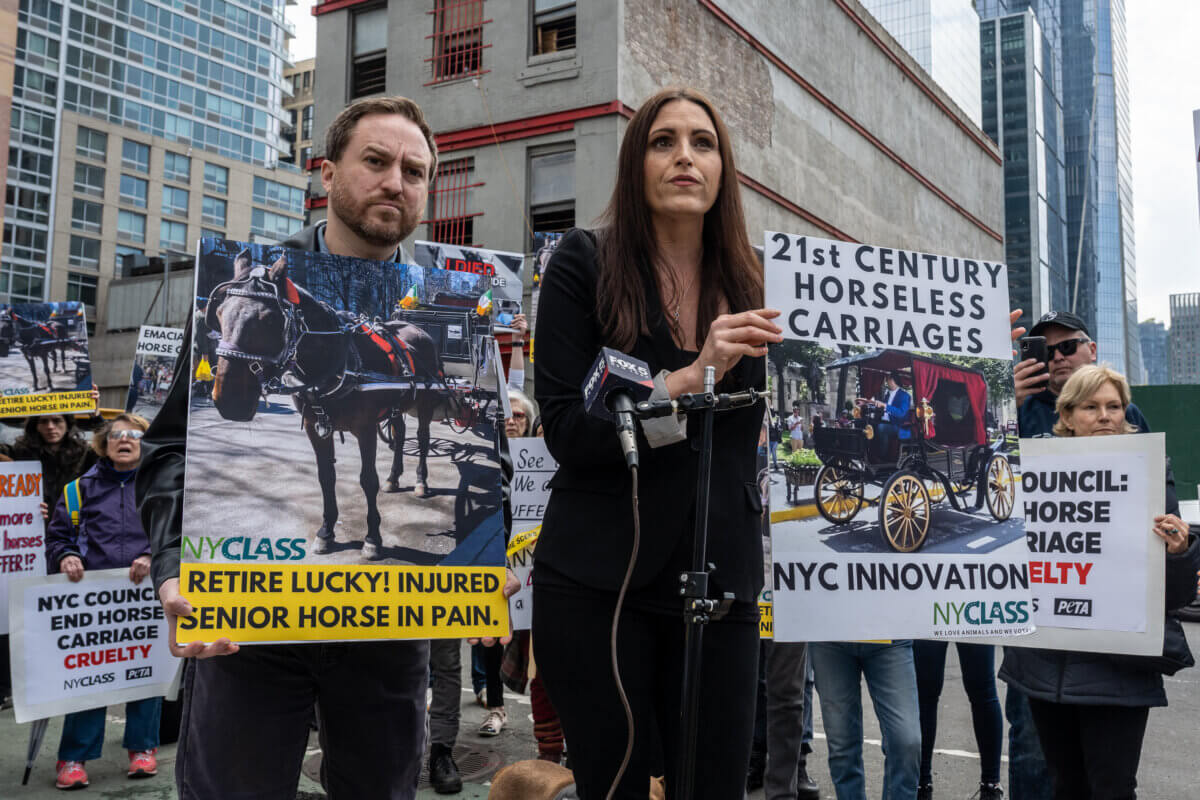
Last Tuesday night, NYCLASS and Harness Horses Uncovered also posted a video on Twitter of yet another horse seen limping while pulling a carriage. And on April 24, a New Yorker who lives close to a stable observed a horse in distress, and was verbally abused by carriage drivers, when she brought it to their attention.
Protestors on Wednesday called on the City Council to pass Intro. 573, also known as Ryder’s Law. The bill, introduced by Queens Council Member Robert Holden in September 2022, has bipartisan support and would outlaw carriage horse operations in New York City, replacing them with electric-powered classic vehicles. According to a poll conducted in late 2022, 71% of New Yorkers support the bill.
Ashley Byrne, PETA’s director of Outreach and Communication, demanded the City Council pass Ryder’s law.
“With Ryder’s law, everyone wins,” Byrne said. “Horses no longer have to suffer on the streets, pulling carriages through all weather extremes when they are sick or injured with no oversight from the city. But it will also supply the industry with a humane alternative, cruelty-free electric carriages.”
“Lucky and Scott and the other unknown injured horse a resident spotted days ago are just the latest victims of long-term neglect and cruelty within the horse carriage business,” added Edita Birnkrant, executive director of NYCLASS. “New Yorkers are sick and tired of this endless cycle of carriage horse abuse and neglect. For better wages without animal abuse, the City Council must fast-track the passage of Ryder’s law and prevent the next tragedy from happening on our streets.”
‘No longer lame’
Christina Hansen, a carriage driver and chief shop steward for the Transport Workers Union (TWU) Local 100, which represents carriage drivers, told amNewYork Metro that Scott had been cleared by the Health Department and his vet to work.
Lucky, she said, has been seen by the veterinarian multiple times and is “on rest until he’s no longer lame with the trot.”
“The horse is slightly lame in the left front, and he’s been on rest, and he improved over two weeks of rest,” Hansen said. “So he’s continuing to rest, you know until they can be evaluated by the equine vets and not by Facebook.”
When asked what she thought of replacing carriage horses with electric carriages, Hansen compared the idea to the city’s new robotics initiatives within the Police Department.
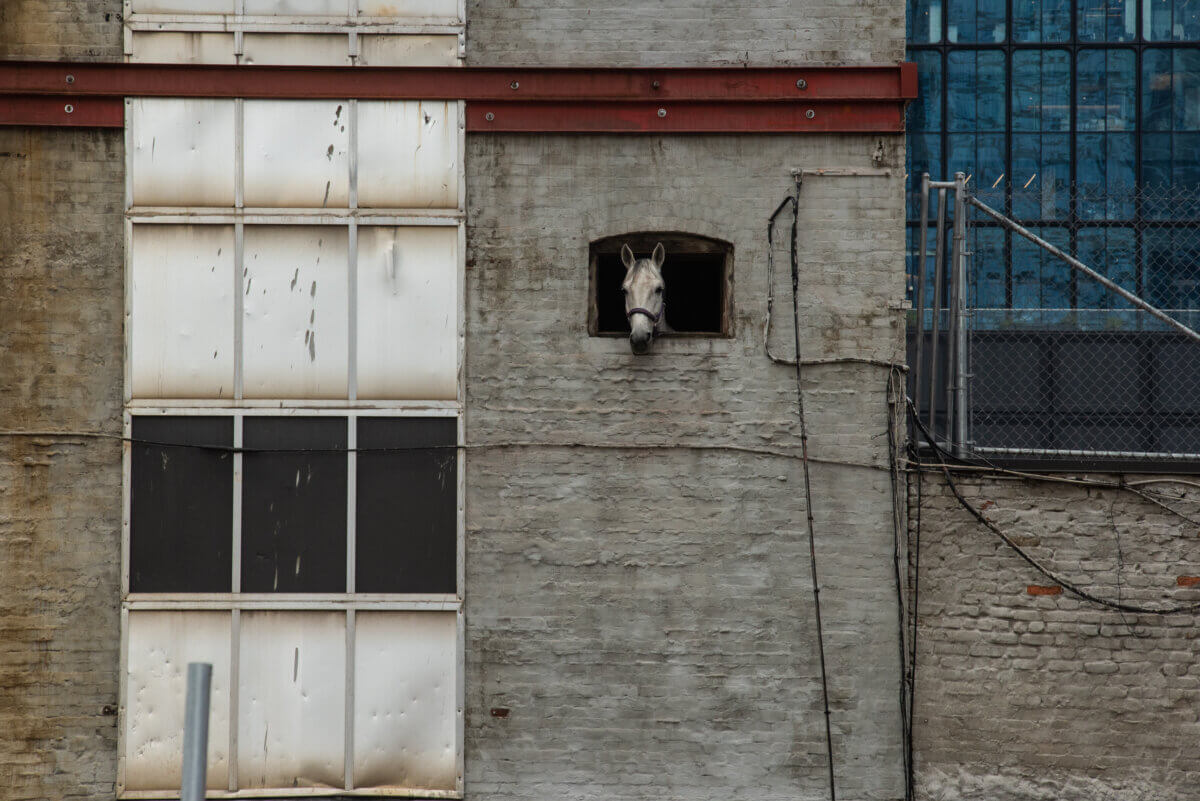
“You know, that’s saying that we should replace dogs with those robot things from MIT. Horses are not replaceable by machines. This is all about the horses,” she said. “We do this because we love the horses, not because we want to be like driving around in a golf cart.”
In a statement released by TWU Local 100, Dr. Gabriel Cook, who has been TWU’s veterinarian and consultant since August 2022, called the protesters claims “erroneous.”
“The overall thesis that these horses are not cared for is simply erroneous,” the statement read. “Since this past summer, we have implemented multiple safeguards, treatments, protocols, and additional veterinary oversight.”
His statement went on to say that he and his staff are at the stables every other week to physically exam the horses, and that they also provided Telehealth consultations.
Petrelli, meanwhile, expressed concerns about veterinarian Cook, who was hired by the horse carriage industry in August of 2022. He called for an independent equine veterinarian to examine all the horses and an independent oversight to monitor all the horses.
In the same TWU statement, Frank McCann, executive director of organizing for TWU Local 100, welcomed the public’s scrutiny, including Petrelli’s.
“It’s not uncommon for a horse — whether it gives leisurely tours of Central Park, races at the track, gives recreational rides on a trail, or jumps in the ring in competition — to have a medical issue come up,” McCann said.
Read more: Man Stabbed Near Myrtle Avenue Subway Station in Brooklyn



